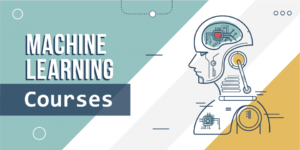Looking for the Best Machine Learning Courses in 2025?
If you want to learn machine learning in 2025 and find the best online machine learning courses, you’ve come to the correct spot.
If you work in technology today, such as a programmer or software engineer, you’ve probably heard of terms like data science, machine learning, artificial intelligence, and so on.
These are the most recent innovations that have an impact on every area, just as IT does when it initially appears. It doesn’t matter if you work for a company, the insurance industry, airlines, or defense; it has impacted all and will soon be influenced by machine learning and artificial intelligence.
That is why, in 2025, it is important to comprehend data science and machine learning, and if you are searching for good resources such as courses and certification, you have come to the perfect spot. I’ve shared the finest machine learning certificates from platforms like Coursera, Udemy, Pluralsight, DataCamp, and Udacity in this article. Some are free, but most need payment if you want certification. If you’re not sure what “machine learning” is, let me give you a quick overview.

What is Machine Learning?
Machine learning is a category of artificial intelligence that allows computers to learn from data and experiences without additional effort. It is a type of algorithm that enables computers to learn from data, spot patterns, and make judgments with little or no human involvement.
Machine learning is used in a variety of industries, from healthcare to finance, to gain valuable insights from large amounts of data. It is useful for creating classification techniques, detecting errors and trends, and automating operations. Businesses can gain a competitive advantage and save time and money by using the power of machine learning.
There are several different types of machine learning algorithms, each with its strengths and weaknesses. Supervised learning methods can perform analysis and regression tasks by learning from labeled data. Unsupervised learning algorithms learn from unlabeled data and are often used for clustering and dimensionality reduction. Reinforcement learning algorithms are used when there is a goal or reward associated with certain actions, and they learn by trial and error.
No matter which type of machine learning algorithm is used, the ultimate goal is to find patterns and make accurate predictions. An important factor in machine learning is data; the more data that is available, the more accurate the predictions and decisions will be. For this reason, businesses are increasingly investing in data science and machine learning to gain a better understanding of their customer base and optimize their operations.
In conclusion, machine learning is a powerful tool that can be used to gain valuable insights from large amounts of data. It can be used to develop predictive models, detect anomalies and trends, and automate processes. With the right data and the right algorithms, businesses can gain a competitive edge and make more informed decisions.
Top 10 Online Courses for Machine Learning in 2025
For those looking to get ahead in the field of machine learning, there are many online courses available to suit their needs. Here, we take a look at the top 10 online machine learning courses in 2025.
- Coursera: Machine Learning Specialization This course is offered by Coursera and provides an introduction to the fundamentals of machine learning, including supervised and unsupervised learning, and reinforcement learning. It covers topics such as decision trees, linear and logistic regression, neural networks, and support vector machines. This course is perfect for those who want to learn the basics of machine learning.
- Udacity: Deep Learning Nanodegree Udacity’s Deep Learning Nanodegree provides students with an in-depth study of the field of deep learning. This course covers topics such as convolutional networks, recurrent networks, and generative adversarial networks. This course is ideal for those who already have an understanding of machine learning and want to take their knowledge to the next level.
- edX: Artificial Intelligence This course from edX provides students with an overview of the field of artificial intelligence, including its history, current applications, and future trends. It covers topics such as supervised and unsupervised learning, natural language processing, and robotics. It is perfect for those who want to understand the broad scope of AI and its implications.
- Udemy: Machine Learning A-Z This course from Udemy is designed to provide students with a comprehensive introduction to the field of machine learning. It covers topics such as supervised and unsupervised learning, decision trees, linear and logistic regression, and neural networks. It is perfect for those who want to get a good grasp of the basics of machine learning.
- Stanford Online: Machine Learning This course from Stanford Online is an in-depth exploration of machine learning, covering topics such as supervised and unsupervised learning, Bayesian networks, and deep learning. It is perfect for those who already have an understanding of machine learning and want to deepen their knowledge.
- GoGlobalWays Machine Learning: This machine learning course is intended to teach people about the complexity of these technologies in a fun and engaging way. It also allows learners to comprehend and apply these principles objectively in the creation of projects that have an impact on the world around them. Using engaging activities, we handle complex subjects such as speech, pictures, and optical character recognition.
- Google Machine Learning Crash Course: This course from Google provides an overview of machine learning, including supervised and unsupervised learning, decision trees, linear and logistic regression, and deep learning. It is perfect for those who want to get a good grasp of the basics of machine learning.
- Udacity: Artificial Intelligence for Robotics This course from Udacity provides students with an in-depth exploration of the field of artificial intelligence for robotics. It covers topics such as supervised and unsupervised learning, natural language processing, and robotics. This course is ideal for those who already have an understanding of machine learning and want to apply it to robotics.




